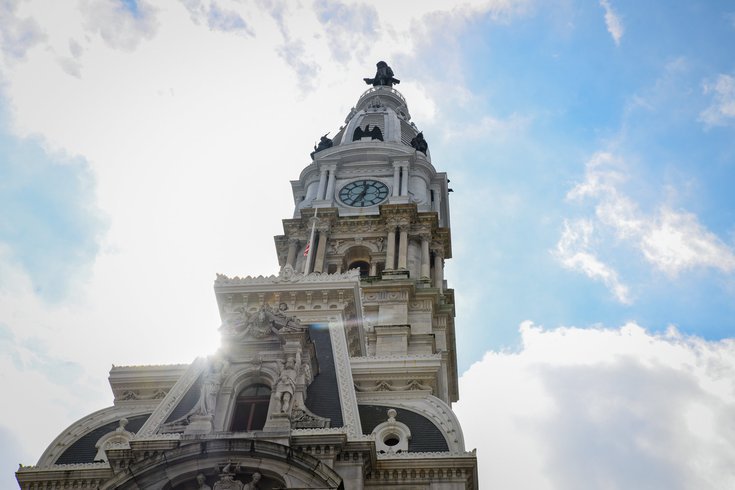
May 03, 2023
 Kate Frese/For PhillyVoice
Kate Frese/For PhillyVoice
Philadelphia voters will be asked four ballot questions, each requiring a change to the city's Home Rule Charter, during the primary election on Tuesday, May 16.
In addition to choosing which Democratic candidate will face off against sole Republican candidate David Oh to become Philadelphia's 100th mayor, voters in this year's primary election will have four ballot questions to answer at the polls on Tuesday, May 16.
Each question proposes a change to the Home Rule Charter, Philadelphia's expansive governing document that defines the powers and responsibilities of the city's government entities. Among the questions posed to voters this month is whether or not the city should create a new cabinet-level government office to oversee the city's public safety and gun violence response.
Another ballot measure proposes allocating more money each year to the city's "rainy day fund," which stores excess revenue for emergencies and unexpected government costs. Others ask whether the city should create a new government division within the Department of Commerce to promote workforce development programs to residents, and whether applicants looking to work with the Citizens Police Oversight Commission can be exempt from the typical testing system employed for city workers.
Polls are open from 7 a.m. to 8 p.m. on Election Day, and registered voters can find where to cast their ballots using the city's polling place locator tool. To learn more about the candidates that will appear on the ballot on Tuesday, May 16, check out a sample ballot provided by Philadelphia City Commissioners.
Below are the details on each question that will appear on the primary ballot in Philadelphia:
How the question appears on the ballot:
Should the Philadelphia Home Rule Charter be amended to expand the requirements for annual minimum appropriations to the Budget Stabilization Reserve, more commonly known as the "rainy day fund"?
The city's Budget Stabilization Reserve, known to most people outside city government as the "rainy day fund," stores surplus and additional revenues for an extended period of time to cover unexpected costs, emergencies or shortfalls. In other cities that have rainy day funds, the money has been used to ease the burden of economic downturns, recessions or, in the case of Philly's fund, the impacts of the COVID-19 pandemic.
In early 2020, $34.3 million in the city's rainy day fund was quickly exhausted. Officials did not plan to contribute to it for at least five years, despite an influx of funding from the American Rescue Plan Act, the Inquirer reported. The money was later replenished through COVID-19 relief funding.
The rainy day fund works like this: The city's finance officers project how much money the city will have left over after spending what's been allocated in the fiscal budget for the upcoming year. If that remaining balance is 3% or more of the projected spending for the upcoming fiscal year, about 0.75% of unrestricted money from the general fund is set aside in the rainy day fund.
The change, proposed by Councilmember Katherine Gilmore Richardson earlier this year, aims to provide more frequent deposits to the rainy day fund to ensure that the city has money in its coffers for emergencies. The proposal would allow the city's finance directors to make their projections about the funding threshold by Feb. 14 using the same year's fiscal budget, and would raise the amount of money set aside based on the remaining balance.
Voting "yes" on this ballot measure supports increasing the threshold for the amount of money that may be set aside for unexpected costs, emergencies and revenue shortfalls in Philadelphia's rainy day fund each year.
Voting "no" on this ballot measure opposes increasing the threshold for the amount of money that may be set aside for unexpected costs in Philadelphia's rainy day fund and would keep the current requirements.
How the question appears on the ballot:
Should the Philadelphia Home Rule Charter be amended to create the Division of Workforce Solutions within the Department of Commerce and to define its duties?
The city's Commerce Department is responsible for promoting economic development, developing opportunities for business growth and providing resources to the city's workers to prepare them for careers in family-sustaining jobs. Within the Commerce Department is the Office of Business Development and Workforce Solutions, which works to attract companies to the city and retain them once they're here.
The proposal, put forth by Councilmembers Darrell Clarke and Katherine Gilmore Richardson, would create the Division of Workforce Solutions within the Commerce Department, solely focused on promoting workforce development programs and resources to residents. The division would connect residents with job training and employment opportunities in the public and private sectors, and would be led by existing members of Commerce Department.
The legislation was unanimously approved by City Council in February and has support from Mayor Jim Kenney's administration.
Voting "yes" on this ballot measure supports creating the Division of Workforce Solutions within the city's Commerce Department to promote workforce development programs and connect residents to job training and employment opportunities in the public and private sectors.
Voting "no" on this ballot measure opposes establishing the Division of Workforce Solutions within the city's Commerce Department and would keep the city's workforce development programs under the guide of the Office of Business Development and Workforce Solutions.
How the question appears on the ballot:
Should the Philadelphia Home Rule Charter be amended to make employees of the Citizens Police Oversight Commission exempt from civil service hiring requirements?
The Citizens Police Oversight Commission is an oversight agency designed to ensure just, transparent and efficient administration of criminal justice in Philadelphia. The group investigates the Philadelphia Police Department's conduct and policies. The Police Oversight Commission, made up of nine members, was established as the Police Advisory Board in 1993 and was revamped in 2021 to improve the relationship between police and the surrounding community.
Most staff members at the Police Oversight Commission are not exempt from civil service, a merit-based system for evaluating candidates for city jobs that ranks applicant test scores. Most city employees are hired through the civil service system, though some, like elected officials and the mayor's secretarial staff, are exempt from the system.
The nine commissioners are chosen from a pool of applicants and nominated by a board of stakeholders before being approved by City Council. They are not considered city workers and are already exempt, though additional staff are hired through the civil service system.
Voting "yes" on this ballot measure supports exempting all staff members of the Citizens Police Oversight Commission from needing to participate in the city's civil service system for hiring city employees. Police Oversight Commission staff members would join the mayor's secretarial staff and elected officials in being exempt from the system.
Voting "no" on this ballot measure opposes exempting the staff of the Citizens Police Oversight Commission from needing to complete the city's civil service exam for hiring city employees. Prospective staff, not the nine commissioners, would still need to complete the civil service exam before being considered for a position.
How the question appears on the ballot:
Should the Philadelphia Home Rule Charter be amended to create the Office of the Chief Public Safety Director and to define its powers, duties and responsibilities?
A proposal to create a government office to oversee Philadelphia's public safety efforts and gun violence response caused an unusual political skirmish between City Council and the Kenney administration earlier this year, as officials unanimously overrode Kenney's veto of the proposal on March 23.
The cabinet-level appointee would be responsible for coordinating the deployment of resources within the city's police, fire, recreation and emergency services departments. If approved by voters, the public safety director would guide city agencies through safety-related policies and provide budget consulting. The position would oversee security in city-owned buildings and develop security contracts for the city and the School District of Philadelphia.
The position is modeled after similar offices in cities like Newark, Chicago and Columbus. In order to craft the legislation, members of City Council took several trips to those areas to observe the ways they are grappling with gun violence.
In a letter to City Council explaining his reasoning behind the veto, Kenney noted that the managing director's office already has many of the responsibilities proposed for the public safety director and that approving the measure could lead to a more complicated structure for reporting issues, rather than streamlining the city's public safety efforts.
If the measure is approved by voters in the primary election, it is unlikely that the first public safety director would be appointed during the Kenney administration. Rather, the next mayor would be the first to appoint the high-ranking government official.
Voting "yes" on this ballot measure supports creating the Office of the Chief Public Safety Director, a cabinet-level government office whose director would oversee the city's gun violence response and public safety efforts. The position would also secure security contracts for the city and the School District of Philadelphia.
Voting "no" on this ballot measure opposes creating the Office of the Chief Public Safety Director and would keep the position's proposed responsibilities in the hands of the city's managing director and other government officials.